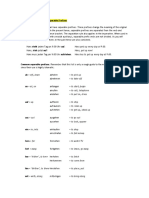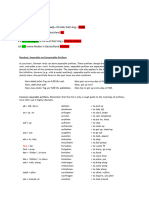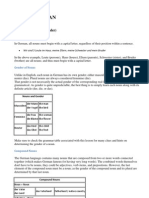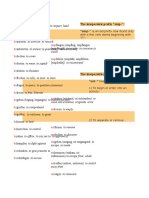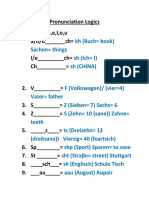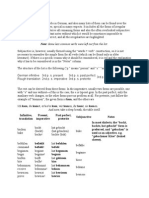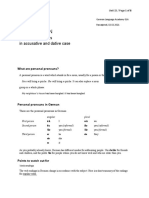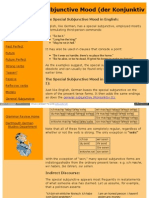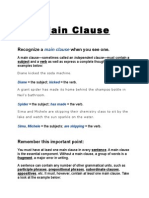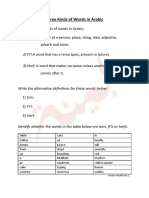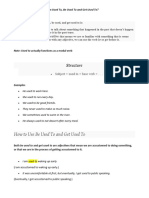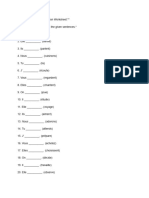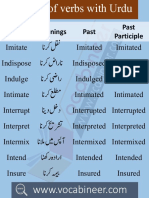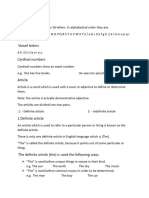Unit 5 Page 1 of 5
UNIT FIVE
Separable verbs in the present tense
What is a separable verb?
These are verbs which are made up of two parts: a prefix and the infinitive of a verb.
For example: auf + stehen aufstehen ‘to get up’.
Comparison with English
Separable verbs are comparable to English phrasal verbs, which consist of an infinitive plus an
adverb or preposition: ‘to get up’, ‘to get on’ etc.
Important separable verbs
Separable verbs are quite frequent in German. Here are some of the most important ones:
abfahren to depart
abholen to pick up
abwaschen to do the washing up
anfangen to start
ankommen to arrive
anrufen to phone
aufhören to stop
aufräumen to tidy up
aufstehen to get up
ausgehen to go out
einkaufen to go shopping
einladen to invite
einschlafen to fall asleep
fernsehen to watch television
saubermachen to clean
stattfinden to take place
vorbereiten to prepare
(sich) vorstellen to introduce oneself ((sich means = reflexive) So it is reflexive verb,
we’ll discuss reflexive verbs later)
German Language Academy GLA, Murree Rd, Opp. Gold Point Plaza, Rawalpindi . Tel./Whatsapp +92 300 0054965
� Unit 5 Page 2 of 5
Prefixes go at the end
When a separable verb is in the present tense, the prefix is usually separated from the finite
form of the verb and goes to the end of the sentence:
anrufen Herr Nolte ruft seine Frau an.
Mr Nolte rings his wife.
aufstehen Bernhard steht um fünf Uhr morgens auf.
Bernhard gets up at five o’clock in the morning.
ausgehen Corinna geht jeden Tag aus.
Corinna goes out every day.
fernsehen Die Kinder sehen jeden Abend fern.
The children watch television every evening.
einkaufen Er kauft im Supermarkt ein.
He goes shopping in the supermarket.
stattfinden Das Meeting findet am Montag statt.
The meeting takes place on Monday.
Separable verbs in two clauses
When a sentence consists of two clauses, the split-off prefix goes to the end of the relevant
clause. This may not necessarily be at the end of the sentence.
clause 1 clause 2 clause 1 clause 2
Ich stehe auf und dann frühstücke ich. I get up and then I have breakfast.
Herr Carlsen sieht fern, Mr. Carlsen is watching television
aber seine Kinder lesen. , but his children are reading.
If you have a sentence with several clauses which use separable verbs, then you have the split-
off part at the end of each clause:
Dr. Schuster schläft erst um vierundzwanzig Uhr ein, aber er steht schon um fünf Uhr auf.
Dr. Schuster only goes to sleep at midnight, but he gets up at five o’clock.
Verbs can have more than one prefixes
A verb often takes more than one prefix. Here are examples of the many different meanings
that the verb kommen ‘to come’ has when combined with a prefix:
German Language Academy GLA, Murree Rd, Opp. Gold Point Plaza, Rawalpindi . Tel./Whatsapp +92 300 0054965
� Unit 5 Page 3 of 5
an + kommen to arrive
mit + kommen to come along
weiter + kommen to get on
herein + kommen to come in
heraus + kommen to come out
nach + kommen to come later
zurück + kommen to come back
Another example is the verb steigen: einsteigen means ‘to get in/on’, umsteigen means ‘to
change’ (trains, buses etc.) and aussteigen means ‘to get out/off’.
You can quite often guess the meaning by knowing what the prefix means.
But that does not work all the time, so meanings of separable verbs need to be learned.
Common separable prefixes
The most common separable prefixes are:
ab-, an-, auf-, aus-, ein-, mit-, nach-, vor-, zu-, zurück-
Some inseparable prefixes
There are also prefixes which are inseparable. They include be-, er-, ge- and ver-. Frequently
used verbs with inseparable prefixes are bezahlen ‘to pay’, erzählen ‘to tell’, verdienen ‘to
earn’, verkaufen ‘to sell’ and verstehen ‘to understand’.
Er bezahlt mit seiner Kreditkarte. He pays with his credit card.
Sie verkauft ihren alten Computer. She is selling her old computer.
As you can see, these prefixes do not separate from the verb.
More about separable verbs
As a beginner you will probably use separable verbs most often as explained above. However,
separable verbs occur also in the imperative, in combination with modal verbs, and in the
perfect and future tense. See Units 6 and 20–23 for more information.
If you cannot find a separable verb in a verb list or dictionary, look up the verbs without its
prefix. So, for example, to find out the simple past tense form of abfahren, look up fahren in
the verb list.
German Language Academy GLA, Murree Rd, Opp. Gold Point Plaza, Rawalpindi . Tel./Whatsapp +92 300 0054965
� Unit 5 Page 4 of 5
Exercise 5.1
Here is a description of Jens Fischer’s day. Complete the gaps with the finite verb and the
prefix.
Example: ausstellen Jens den Wecker um sieben Uhr .
Jens stellt den Wecker um sieben Uhr aus.
1 Jens um halb acht Uhr . (aufstehen)
2 Er seine Arbeit um neun Uhr . (anfangen)
3 Mittags er seine Freundin . (anrufen)
4 Um siebzehn Uhr er mit seiner Arbeit . (aufhören)
5 Nach der Arbeit er im Supermarkt . (einkaufen)
6 Abends er . (fernsehen)
7 Er mit seiner Freundin . (ausgehen)
8 Um Mitternacht er meistens . (ausgehen)
Exercise 5.2
Use your dictionary to check which ones of the following verbs are separable. Put a tick against
them. The first separable verb has been done for you.
aufstehen ✓ verlieren abfahren anrufen
verstehen fernsehen aufhören stattfinden
einladen mitkommen bezahlen erzählen
aufräumen frühstücken einkaufen benutzen
Exercise 5.3
Now use the separable verbs from Exercise 5.2 to fill in the gaps below. The
first has been done for you.
1 Herr und Frau Conradi stehen um sieben Uhr auf.
2 Die Kinder ihr Zimmer .
German Language Academy GLA, Murree Rd, Opp. Gold Point Plaza, Rawalpindi . Tel./Whatsapp +92 300 0054965
� Unit 5 Page 5 of 5
3 Er immer im Supermarkt .
4 Wir gehen ins Kino. du ?
5 Frau Schmidt mit dem Rauchen .
6 Wann das Konzert ?
7 Herr Claus liebt Seifenopern. Er jeden Tag .
8 Wann der nächste Zug nach Hamburg ?
9 Wir viele Gäste zu unserer Party .
10 Sie kauft eine Telefonkarte und ihre Mutter .
Exercise 5.4
Translate the following sentences:
1 I get up at six o’clock.
2 I start my work at 8 o’clock.
3 The meeting takes place on Monday.
4 When does the train depart?
5 When does the train arrive?
6 Michael is tidying up and his children are watching television.
7 Are you coming along to the cinema?
Checklist ✓
1 Which part of the verb is split off?
2 Where does it go in a sentence?
3 What happens if a sentence consists of more than one clause?
4 How can you check whether a verb is separable?
5 Do you know which prefixes are non-separable?
German Language Academy GLA, Murree Rd, Opp. Gold Point Plaza, Rawalpindi . Tel./Whatsapp +92 300 0054965
